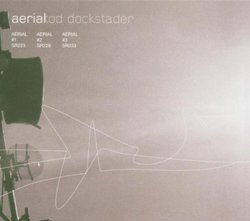| All Artists: Tod Dockstader Title: Aerial #1 Members Wishing: 2 Total Copies: 0 Label: Sub Rosa Release Date: 3/29/2005 Album Type: Import Genres: Dance & Electronic, Jazz, Special Interest, New Age, Pop, Classical Styles: Ambient, Electronica, Experimental Music, Dance Pop, Historical Periods, Modern, 20th, & 21st Century, Instruments, Electronic Number of Discs: 1 SwapaCD Credits: 1 UPC: 5411867112235 |
Search - Tod Dockstader :: Aerial #1
 | Tod Dockstader Aerial #1 Genres: Dance & Electronic, Jazz, Special Interest, New Age, Pop, Classical
|
Larger Image |
CD Details |
CD ReviewsMore than organized sound... Gerard Dionne | 12/15/2006 (5 out of 5 stars) "John Cage famously posited that the most eloquent music occurs without human intervention; that which we hear if we simply sit quietly. But, much of Cage's music, especially the aleatoric, is more interesting to talk and think about than to listen to. Composers of electronic music have always been on the defensive regarding the issue of whether or not their compositions are, in fact, music, as opposed to organized sound or composed noise. Part of the problem is that many listeners wonder if the music is driven by evolution of the technology; e.g., "That's a neat sound, let's plug it in here." I'm afraid that that may be the case among lesser composers. On the other hand, technology has always had a hand in moving the thresholds of musical thought and playing technique. Just try to imagine Franz Lizst played on a harpsicord, or even an early piano-forte.
But enough about me. Tod Dockstader is one of the 2nd generation of composers to have utilized purely electronic means to realize the music - the performance is the composition, and vice-versa. I won't go deeply into his biography, but he worked in the hinterlands of movie soundtracks in the late '60s and '70s. Denied access to the major e-music creative centers such as the Columbia-Princeton Electronic Music Center, he was forced to make his own way with more primitive and limited resources. Therein lies the wonder of this music. Dockstader has limited the raw material of Aerial 1, 2 and 3, a vast composition with a duration of well over three hours, to shortwave radio noise; the stuff you hear between recognizably human signals. Divided into episodes, the music soars and rolls over the listener with an amazing power; and it just keeps on coming. As with any worthy music, the whole is much more than the sum of the parts. And the titles of the episodes reveal that Tod realised them without programatic pretense; they simple suggest how the sound plays on the ear, and not incidentally, give us a handle on each more usable than merely numbering them. Is this music? I would say, mostly emphatically, yes. What does it mean? What does any music mean. Does it conjur images? I suppose that's unavoidable, but not necessarily undesirable. Will it pay your taxes and get rid of your dandruff? No." |

 Track Listings (15) - Disc #1
Track Listings (15) - Disc #1